Can You Keep a Freezer in a Garage in Summer?
Author: Omar Alonso | Editor: Omar Alonso
Review & Research: Jen Worst & Chris Miller
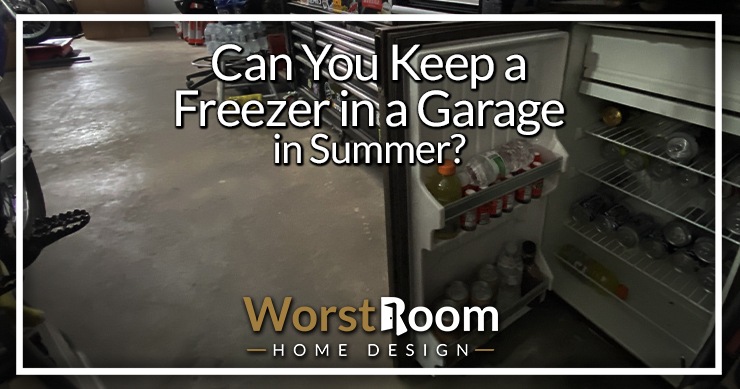
Keeping a freezer in the garage is ideal for storing meat and other perishable products. Using the garage for freezer storage gives you more floor space in the kitchen, freeing it up for other appliances, like that double-door refrigerator you plan on buying. But can you keep a freezer in a garage in summer weather conditions?
Will it affect the function of this appliance or use more energy than it's supposed to? If you live in a warm region, the summer can get hot, raising interior temperatures in the garage and even increasing humidity in the space.
When the temperature rises, it can impact the correct function and operation of the freezer. But is it enough to damage the unit? This post unpacks everything you need to know about leaving the freezer in the garage during the summertime.
Does Warm Weather Affect a Garage Freezer?
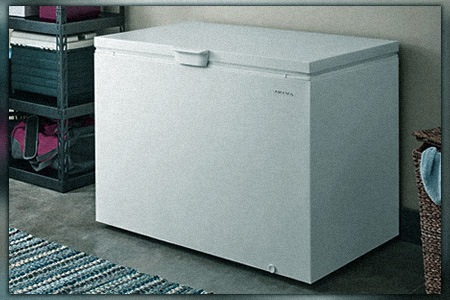
Yes, the warm summer weather impacts the freezer's function and operation, causing it to work harder to cool its interior. Air must circulate freely around the base and rear of the freezer, where you'll find the compressor and coils.
When the weather warms up, the freezer must work harder to keep things cool, making water take longer to freeze, forcing the compressor to work harder. As a result of the extended operation of the compressor and condenser, the unit uses more electricity to function properly.
The compressor will keep working in warm weather conditions, but it shortens its service life if it's hot in the garage and it must work continuously. Eventually, you'll get an oil leak in the compressor, causing the freezer to malfunction.
If you have an insulated garage, you won't have to worry about it so much. The insulation creates a thermal barrier, and insulated garages stay much cooler than uninsulated spaces during the summer. In this case, it won't affect the freezer much at all.
Will Freezers Work in Hot Garages?
Your freezer will operate normally in a warm garage during the summer. Here are a couple things to consider before setting it up.
- Ensure the area where you want to place the freezer in the garage is dry, clean, and level.
- Keep the freezer away from windows and direct light when the doors are open. The freezer must work harder to maintain temperature if the sun gets on the freezer.
So can you keep a freezer in a hot garage? You can. It will work harder and perhaps fail sooner, but you can do it.
Tips for Running the Freezer in a Garage in Summer
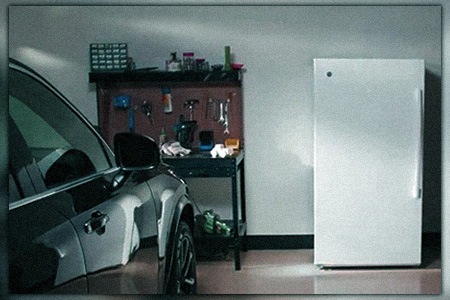
We selected a roundup of top tips to keep your freezer running optimally in all summer weather conditions.
Tip #1 – Keep the Garage as Cool as Possible
Freezers have limitations on what they can handle regarding ambient temperature around the coils, compressor, and condenser. If the interior temperature of the garage exceeds 110˚F, it won't function optimally, as if you left the freezer door open some.
The compressor will likely run continuously or near continuously in these conditions. As a result, you're asking for a blowout and an oil leak. The compressor will fight against the ambient temperature and could burn out under these conditions.
We recommend fitting a cheap wall thermometer to measure the ambient temperature inside the garage. Fix it to the back wall behind the freezer.
If the temperature inside the garage reaches close to 110°F, you can run a fan and use it to provide better circulation in the garage.
The circulating air should drive the temperature down by up to 10°F. Vented or air-conditioned garages should be fine as the vents allow the hot air to escape, and air-conditioning systems keep the ambient temperature cool and stable.
Tip #2 – Inspect and Maintain the Compressor & Thermostat
The thermostat and compressor are vital freezer components. The thermostat checks the temperature inside the unit, turning on the compressor when it rises above a fixed set point. Most freezers have an access panel around the base, allowing you to reach the condenser, compressor, and thermostat.
Since the garage is usually dusty, it's a good idea to remove the panel once every quarter and wipe out any dust inside the space. Proper maintenance prevents the build-up of dust that stops the optimal operation of these components.
Tip #3 – Place the Freezer Properly
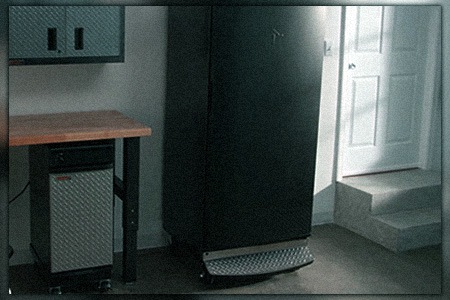
We recommend placing your freezer in an area at the back of the garage, away from the sunlight when you open the doors. Keep it away from windows and any sources of direct sunlight. The floor should be level, or the compressor should make a louder humming noise than usual.
Since you're likely positioning it against a wall, leave around six to eight inches between the back of the wall and the coils. This spacing allows airflow to circulate around the back panel, keeping the unit from overheating.
Tip #4 – Check the Garage Wiring
Some garages have electrical wiring, and others don't. If you don't have a wired garage, don't place the freezer in it. Using an extension cord to run the freezer is a bad idea. Can you put a freezer in a garage in summer? Yes, but it must be powered properly, and you need to be careful if you use an extension cord for a refrigerator.
Most manufacturing brands will advise against extension cords on normal outlets in the user manual – stick to these recommendations. Supply current to the freezer using a 60 Hz, AC, 15-volt electrical outlet.
Tip #5 – Keep the Freezer Full
The more stuff you have in the freezer, the better it functions. When the food in the freezer freezes, it reduces the air volume inside the chest, and there's less work for the freezer to do to keep everything cool.
Keep the freezer as full as possible at all times, and it won't have to work as hard, reducing wear and tear on the compressor, condenser, and coils.
Does a Freezer Use More Energy If It's in the Garage?
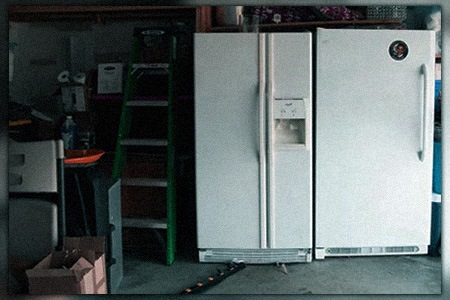
Yes. Since the freezer must work harder to cool the unit's interior, it makes sense that it uses more energy. Placing the freezer in a warm garage with ambient temperatures above 90°F, and high humidity, can increase its energy consumption by as much as 50%.
Higher ambient temperatures mean the compressor works harder and comes on more often than in a climate-controlled environment. The more time the compressor spends working, the more energy it requires.
The best choice for a garage freezer is an ENERGY STAR-certified freezer. These models use approximately 15% less electricity than other models. Look for the ENERGY STAR logo when purchasing your freezer; it should be visible in the showroom. If you can't see the sticker on the unit in the store, ask an attendant if it's an ENERGY STAR-rated model.
What is a Garage-Ready Freezer?
If you want the best results from your garage freezer, we recommend going with a "garage-ready" model. What is a garage-ready freezer? These models have a variable thermostat, ensuring that the compressor activates at the right temperature setting to cool the unit.
The freezer has several sensors placed around the chest's interior, checking the internal temperature to ensure optimal operation of the compressor and condenser.
These models have better insulation to keep the interior at freezing temperatures and better venting to prevent debris build-up in the compressor cavity.
How Does a Garage-Ready Freezer Operate in Fluctuating Temperatures?
As mentioned, a garage-ready freezer has a specific design to handle the hostile environment of a warm garage. These models can handle temperature ranges between 0 °F to 110 °F, making them the ideal choice for a garage freezer.
Check the thermometer you fitted to the wall on a hot day and note the temperature between 4 pm and 6 pm; these are the hottest parts of the day. Set the freezer to operate at a temperature range of °F to the upper and lower readings.
Some garage-ready models feature an industrial compressor, allowing for more frequent activation of the compressor, preventing it from overheating. These models also have better insulation in the sides and lid, ensuring the interior remains cool.
Garage-ready freezers have a purpose-built design for use in hostile conditions. They usually feature temperature and defrost control mechanisms and utilize high-efficiency evaporators to achieve improved energy efficiency over standard models.
Can You Keep Freezers in Unheated Garages During Winter?
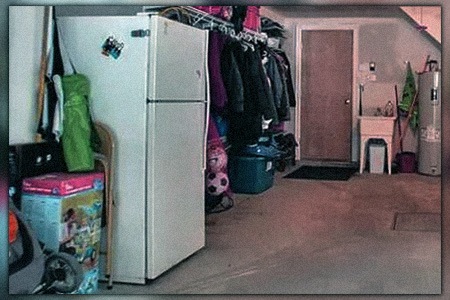
If your garage gets below freezing in the winter, it could damage your freezer and spoil what you store inside. The cold ambient temperatures fool the thermostats into thinking the freezer compartment is at the correct temperature when it isn't.
When the thermostat doesn't detect the right temperature range, it won't signal to the compressor. As a result, the freezer doesn't turn on as often as needed to cool the interior. So, your food starts to thaw and spoil.
Extremely cold weather in the garage can cause frost to build up around the condenser and the insulation. As a result, the frozen components experience faster rates of deterioration, giving you a shorter service life.
Eventually, the freezer stops maintaining the correct temperature. The compressor must compensate for this, turning on more frequently, leading to a higher risk of burnout or oil leaks.
Key Takeaways Regarding a Freezer in a Hot Garage in Summer
Let’s cover the main takeaways from above again so we can solidify the knowledge in our heads.
- Yes, you can keep the freezer in a garage during the summer.
- Ensure the ambient temperature isn't above 110 °F in the garage.
- Position the freezer away from direct sunlight and 6 to 8 inches from the walls.
- Look for an ENERGY STAR-rated model for optimal electrical efficiency.
- Purchase a "garage-ready" freezer if possible.
As long as you have normal garage conditions and give the freezer enough space to intake air and expel it through ventilation, you can certainly have a freezer in a garage. My parents had one my entire life and it was fine. Many of my neighbors have them to this day.
Can You Put a Freezer in the Garage in Summer?
Rest-assured that you can use a freezer of any shape in a garage. Can you put a chest freezer in a hot garage? Yes, just make sure the temperature isn’t above 110 degrees or the freezer may struggle to maintain your food’s temperature at safe levels (0 °F or -18 °C). So can you keep a freezer in a garage in summer? Yes, in most cases, and in others you can help with ventilation to make it safe.



